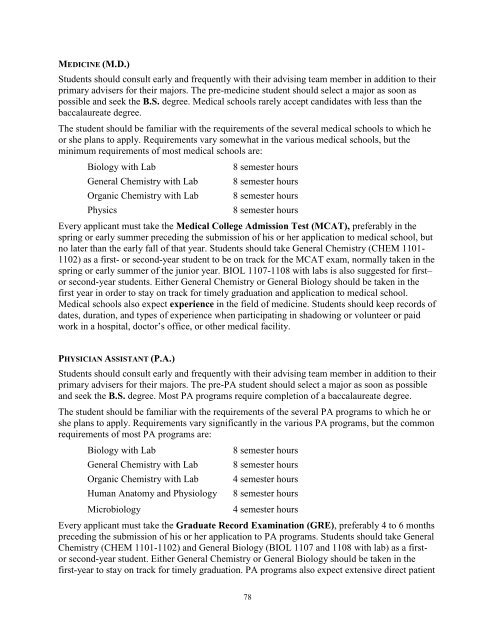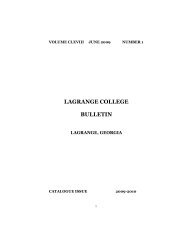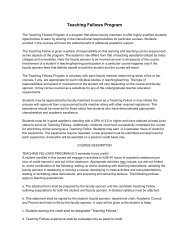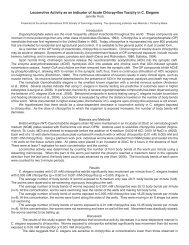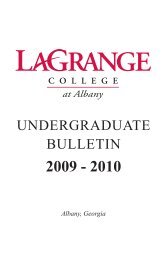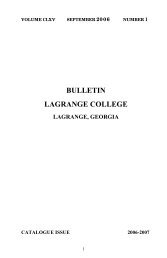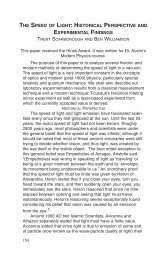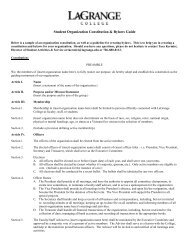undergraduate bulletin - LaGrange College
undergraduate bulletin - LaGrange College
undergraduate bulletin - LaGrange College
Create successful ePaper yourself
Turn your PDF publications into a flip-book with our unique Google optimized e-Paper software.
MEDICINE (M.D.)<br />
Students should consult early and frequently with their advising team member in addition to their<br />
primary advisers for their majors. The pre-medicine student should select a major as soon as<br />
possible and seek the B.S. degree. Medical schools rarely accept candidates with less than the<br />
baccalaureate degree.<br />
The student should be familiar with the requirements of the several medical schools to which he<br />
or she plans to apply. Requirements vary somewhat in the various medical schools, but the<br />
minimum requirements of most medical schools are:<br />
Biology with Lab<br />
General Chemistry with Lab<br />
Organic Chemistry with Lab<br />
Physics<br />
8 semester hours<br />
8 semester hours<br />
8 semester hours<br />
8 semester hours<br />
Every applicant must take the Medical <strong>College</strong> Admission Test (MCAT), preferably in the<br />
spring or early summer preceding the submission of his or her application to medical school, but<br />
no later than the early fall of that year. Students should take General Chemistry (CHEM 1101-<br />
1102) as a first- or second-year student to be on track for the MCAT exam, normally taken in the<br />
spring or early summer of the junior year. BIOL 1107-1108 with labs is also suggested for first–<br />
or second-year students. Either General Chemistry or General Biology should be taken in the<br />
first year in order to stay on track for timely graduation and application to medical school.<br />
Medical schools also expect experience in the field of medicine. Students should keep records of<br />
dates, duration, and types of experience when participating in shadowing or volunteer or paid<br />
work in a hospital, doctor‘s office, or other medical facility.<br />
PHYSICIAN ASSISTANT (P.A.)<br />
Students should consult early and frequently with their advising team member in addition to their<br />
primary advisers for their majors. The pre-PA student should select a major as soon as possible<br />
and seek the B.S. degree. Most PA programs require completion of a baccalaureate degree.<br />
The student should be familiar with the requirements of the several PA programs to which he or<br />
she plans to apply. Requirements vary significantly in the various PA programs, but the common<br />
requirements of most PA programs are:<br />
Biology with Lab<br />
General Chemistry with Lab<br />
Organic Chemistry with Lab<br />
Human Anatomy and Physiology<br />
Microbiology<br />
8 semester hours<br />
8 semester hours<br />
4 semester hours<br />
8 semester hours<br />
4 semester hours<br />
Every applicant must take the Graduate Record Examination (GRE), preferably 4 to 6 months<br />
preceding the submission of his or her application to PA programs. Students should take General<br />
Chemistry (CHEM 1101-1102) and General Biology (BIOL 1107 and 1108 with lab) as a firstor<br />
second-year student. Either General Chemistry or General Biology should be taken in the<br />
first-year to stay on track for timely graduation. PA programs also expect extensive direct patient<br />
78


